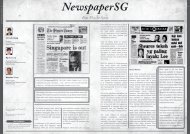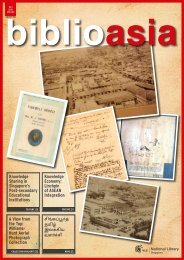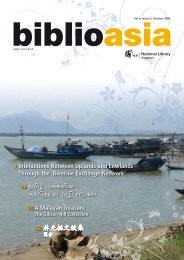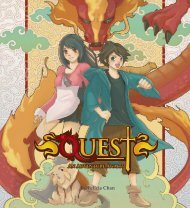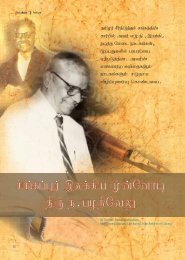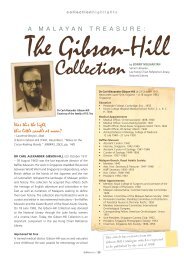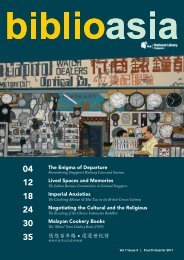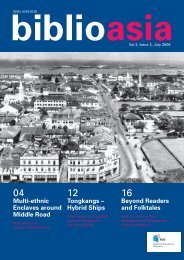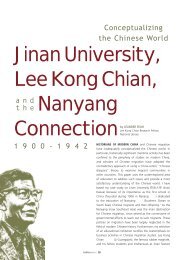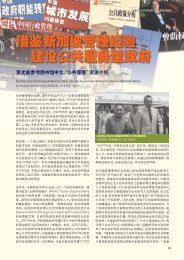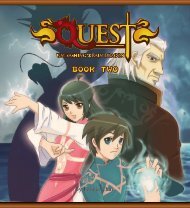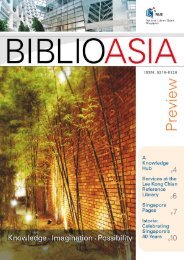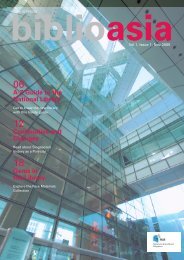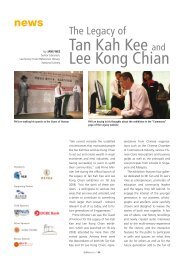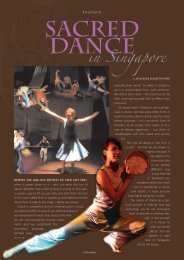Vol 7 Issue 4 | March 2012 - National Library Singapore
Vol 7 Issue 4 | March 2012 - National Library Singapore
Vol 7 Issue 4 | March 2012 - National Library Singapore
You also want an ePaper? Increase the reach of your titles
YUMPU automatically turns print PDFs into web optimized ePapers that Google loves.
24<br />
and avoids the few childhood friends he has. In the end, he<br />
I do remember exactly how liberated and subversive I felt as a<br />
being kiasu themselves. The Kuppies, as Mr Kiasu’s creators<br />
<strong>Singapore</strong>ans hated Mr Kiasu; how could they when they were<br />
25<br />
“escapes” into a canvas he is drawing, to be with the dream girl<br />
result.” Comic books have that effect and lend themselves to<br />
called themselves, promoted this negative trait of <strong>Singapore</strong>ans<br />
still lapping it up The bestsellers in a country reflect its national<br />
who exists only in his mind.<br />
social criticism and satire.<br />
and ended up being very well-off. Such a trend reflected the<br />
character. We were buying and consuming ghost stories and Mr<br />
The characters Khoo favours in his stories are marginal figures,<br />
1990s — Mr Kiasu<br />
heady economic climate of the 1990s.<br />
Kiasu books, which said something about what we wanted for<br />
entertainment. Mr Kiasu was a product of its time and its demise<br />
people who are downtrodden in life. He wrote on the back cover<br />
The Mr Kiasu character expanded into a brand with merchandising<br />
had everything to do with the times. The 1997 Asian financial<br />
of Unfortunate Lives:<br />
Kiasu, according to the Coxford Singlish Dictionary, is Hokkien<br />
galore — there was a radio show, magazines, a regular strip in<br />
crisis was a wake-up call that the good times were over. The<br />
for to be “afraid of losing”. 6 Being kiasu often leads <strong>Singapore</strong>ans<br />
The Sunday Times, McDonald’s meals, a TV show, a CD, and<br />
following year, The Straits Times reported that the Mr Kiasu<br />
“The human personality has never ceased to fascinate me<br />
to behave ungraciously, such as rushing into Mass Rapid Transit<br />
a musical. In 1993, Mr Kiasu recorded an annual turnover of<br />
merchandising company had gone into debt.<br />
with all its complexities and charms. I am concerned about the<br />
(MRT) trains without waiting for other passengers to exit. Despite<br />
$800,000 from merchandising. A year later, Kiasu Corners were<br />
welfare of the individual, the little<br />
the fact that <strong>Singapore</strong>ans are not<br />
set up at 7-Eleven stores islandwide. 9 By that time, the Kuppies<br />
The eighth and final book of the Mr Kiasu series, “Everything<br />
man who awakens each morning to<br />
proud of such behaviour, it is also<br />
had signed up to 40 licences for<br />
Also Act Blur”, was released in<br />
find solace in his life. These are the<br />
something good-naturedly laughed<br />
their character. 10<br />
1998. The death knell was heard<br />
characters I care for and cherish …<br />
about. It took three young men who<br />
in a parliamentary speech made<br />
The dreamers and those who long<br />
met during their national service days<br />
But there was already a<br />
by then Minister for Education Teo<br />
for what they have lost.”<br />
to bring this to national attention and<br />
backlash. In 1993, The Straits<br />
Chee Hean: “Let the icon of the<br />
allow <strong>Singapore</strong>ans to recognise this<br />
Times held an essay competition<br />
Kiasu <strong>Singapore</strong>an fade into 20th<br />
In Khoo’s stories, in order to survive,<br />
unpleasant trait in themselves.<br />
for <strong>National</strong> Day and many<br />
century history, and in its place<br />
one either has to escape from<br />
readers wrote in to condemn<br />
emerge the Active <strong>Singapore</strong> — the<br />
reality into art like in “The Canvas<br />
One year after Khoo’s Unfortunate<br />
kiasu behaviour. Forum letters to<br />
<strong>Singapore</strong>an of the 21st century.” 12<br />
Environment” or into the past like<br />
Lives premiered at the <strong>Singapore</strong><br />
The Straits Times also said that<br />
the protagonist of “Memories of<br />
Book Fair, Johnny Lau, James<br />
McDonald’s Kiasu Burgers left a<br />
So how does the Mr Kiasu series<br />
Youth”. In the latter story, a middle-<br />
Suresh and Lim Yu Cheng released<br />
bad taste in the mouth because<br />
read after all these years One thing<br />
aged man is fired from his mundane<br />
the first Mr Kiasu book, “Everything<br />
of the way they mocked society. 11<br />
that will strike you is that Mr Kiasu<br />
job. He visits his old neighbourhood<br />
I Also Want”, at the same event to<br />
is not as hateful as the media then<br />
and meets his younger self and is<br />
great success. The first print run was<br />
But the going remained good for<br />
made him out to be. He is rather<br />
reminded of the dreams he once<br />
3,000 and the book sold out within<br />
the Kuppies. Up to 1998, a new<br />
had and the disappointment that his<br />
life has become.<br />
Such bleakness begs the question:<br />
why the pessimism when things<br />
weeks. 7<br />
One of the main reasons for the<br />
success of the comic was that its<br />
creators struck a chord with the<br />
Mr Kiasu book was released<br />
almost every year like clockwork.<br />
They were bestsellers, which<br />
put paid to the argument that<br />
E<br />
All rights reserved. Comix Factory, 1991.<br />
F<br />
Display of comics collection at a public library.<br />
were turning around for the arts<br />
and the nation was in good shape<br />
E<br />
1990s zeitgeist. The early 1990s was<br />
a time when money was easily made<br />
F<br />
The answer lies in the last story of Unfortunate Lives, “State<br />
at the stock and property markets in <strong>Singapore</strong>. The mood was<br />
of Oppression”. One of the shortest stories in the book, it<br />
one of much optimism both locally and internationally. The Berlin<br />
narrates, in the form of letters, the life of an old woman who<br />
Wall had come down. The “evil empire” that was the Soviet Union<br />
has been detained without trial for 40 years in a South African<br />
had collapsed. The international coalition force led by the United<br />
country. Imprisoned for her political beliefs, she refuses to<br />
give in to the oppression of the state. In Khoo’s drawing, the<br />
character looks Chinese.<br />
When Khoo studied at the United World College in the early<br />
1980s, his art teacher was Teo Eng Seng, who influenced him<br />
States had successfully ended Saddam Hussein’s occupation<br />
of Kuwait. In <strong>Singapore</strong>, the economy had rebounded after the<br />
1985 recession. Lee Kuan Yew had handed over the reins of<br />
power to Goh Chok Tong. It was a smooth transition and we were<br />
all ready for The Next Lap.<br />
The <strong>National</strong> <strong>Library</strong> Board started building its comics collection in 1999 with the opening of the <strong>Library</strong>@Orchard on the top floor of<br />
Ngee Ann City. The idea for starting such a collection came out of a desire to offer something different at the new library in the heart<br />
of Orchard Road, and capturing the youth market was a key consideration. Following the successful introduction of comics in the<br />
<strong>Library</strong>@Orchard, comics collections were rolled out at other public libraries islandwide and the genre has steadily risen in popularity<br />
among library users.<br />
a lot. In 1987, Teo’s sister, Teo Soh Lung, was arrested as one<br />
of the “Marxist Conspirators”. Khoo wrote a story about her<br />
detention but changed the setting of the story to South Africa. 5<br />
Khoo did not draw many comics after this. He went on to become<br />
Mr Kiasu epitomised the typical <strong>Singapore</strong>an of the early 1990s.<br />
Short, stumpy and bespectacled (looking somewhat like its artist,<br />
Lim Yu Cheng), Mr Kiasu was brash, obnoxious and a diehard<br />
bargain hunter always on the lookout for discounts, free samples,<br />
and the best deals.<br />
From 2006 to 2010, manga series such as Ranma by Rumiko Takahashi and Zatch Bell! by Makoto Raiku, and Case Closed by<br />
Gosho Aoyama dominated the top 30 most-read lists in the earlier years together with a smattering of English titles such as Garfield<br />
and Hellboy. However, in 2009 and 2010, English-language comics such as The Amazing Spider-Man, The Mighty Avengers, and<br />
game-based adaptations like World of Warcraft began appearing in the lists of popular comics.<br />
an internationally-acclaimed filmmaker, with works like Mee Pok<br />
Man and Be With Me. But many of the stories he told in his films<br />
and the characters he created on screen had their origins in the<br />
hard luck tales of Unfortunate Lives.<br />
The character of Mr Kiasu was meant to make fun of<br />
<strong>Singapore</strong>ans’ fear of losing out and their desire to be Number<br />
One in everything. His creators were aware that mainstream<br />
Besides building its print collection, the <strong>National</strong> <strong>Library</strong> Board has also been offering comics electronically through databases such<br />
as I-Manga and OverDrive, which are available from its eResources website (http://eresources.nlb.gov.sg). Although the <strong>Library</strong>@<br />
Orchard closed in 2007, comics have become a staple of the <strong>National</strong> <strong>Library</strong> Board’s collection.<br />
publishers did not want to publish their first book because the<br />
In his introduction to Joe Sacco’s Palestine (Fantagraphics<br />
character projected an unflattering image of <strong>Singapore</strong>ans. But<br />
-- Sebastian Song, Lynn Koh, Roy See and Reena Kandoth, <strong>National</strong> <strong>Library</strong> Board<br />
Books, 2002), Edward Said, the late cultural critic, said: “I<br />
the other reason why they went into self-publishing was that they<br />
don’t remember when exactly I read my first comic book, but<br />
feared losing control of their character. 8 In other words, they were



